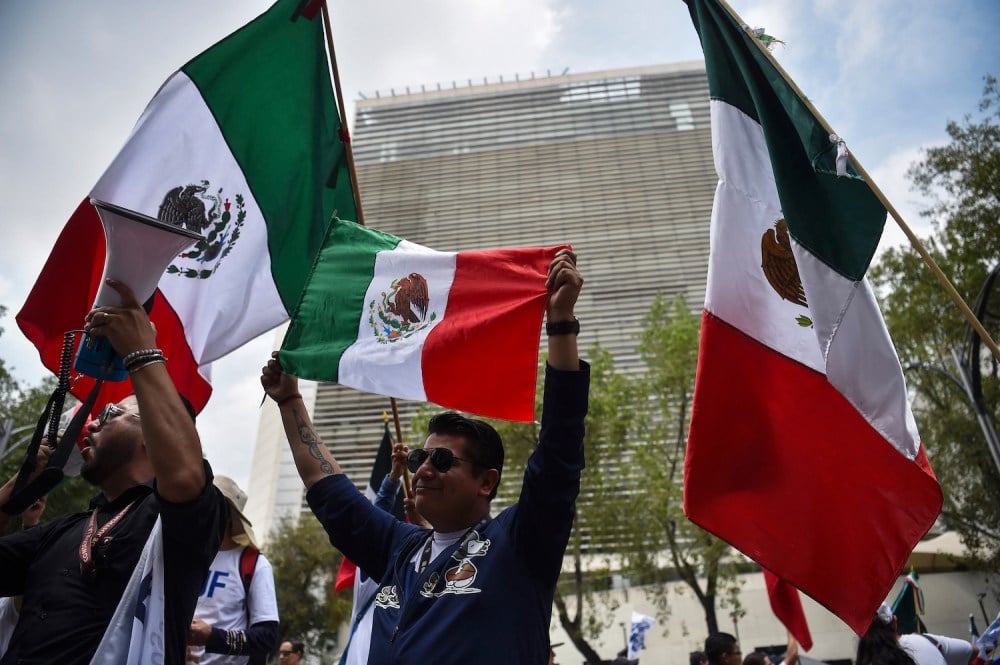Last fall, Mexico’s ruling Morena party approved a constitutional reform to overhaul the judiciary. Defying international standards and democratic best practices, Mexico will become the only country in the world where all judges are elected by popular vote. (Judges are elected at the state and local levels in a handful of countries, including the United States.)
Mexico’s judicial vote will occur in two phases. The first half of the nation’s judges will be replaced in a June 1 election, which will fill 881 federal positions—including electoral judges and Supreme Court justices—and nearly 2,000 local roles. The remaining 4,000 positions will be filled in a second election scheduled for 2027.
The judicial reform marks Mexico’s most profound and damaging political shift in decades. Championed by former President Andrés Manuel López Obrador, the country’s Congress passed the judicial reform measure last September, following elections in June. A new slate of legislators took office on Sept. 1, but President Claudia Sheinbaum wasn’t inaugurated until October. That briefly gave López Obrador the supermajority he needed to push through the reform.
López Obrador had long sought a judicial overhaul. Intent on eradicating neoliberalism in Mexico, he insisted that an entrenched oligarchy that allowed foreign companies to operate with impunity had captured the country’s justice system. He was open about his opinions about the judiciary: Last year, he asked: “The corrupt judges—are they going to continue defending foreign companies that come to loot, rob, and affect the economy of Mexicans?”
To be sure, corruption and impunity are real problems in Mexico—and the country’s judiciary is badly in need of change. Electing judges, however, is not the way to fix these problems.
The judicial reform will likely encourage more corruption and impunity by solidifying Morena’s control over the judiciary. It appears to be a political crusade above all: The Supreme Court presented a major obstacle to López Obrador’s administration, striking down several of his flagship initiatives, including a constitutional reform that would have placed public security under military control and an energy reform aimed at eliminating private investment.
Although López Obrador devised the reform, Sheinbaum—his anointed successor—supports the measure. She has said that electing judges will make Mexico the “most democratic country in the world.” But the reform is not designed to empower citizens. On the contrary, the Inter-American Commission on Human Rights has expressed “grave concern” about the “potential impact on the right of access to justice, guarantees of judicial independence, and the rule of law.”
Threats to judicial independence start at the ballot box. Candidate lists for Sunday’s vote at both the federal and local levels were selected by Morena-controlled committees that operated without transparency or clear guidelines. “Selection committees appointed by the three branches of government were established to vet and officially nominate candidates from close to 50,000 people who registered to run for a judicial post,” David Mora, a senior analyst at the International Crisis Group, wrote. “In such a crowded field, however, unofficial support from political bosses became the most effective way to stand out.”
In some states, committees conspired to ensure that only one candidate would appear on the ballot per post, effectively eliminating competition. Each state runs its own opaque candidate selection process. In Durango and Aguascalientes, committees approved only one candidate per vacancy, essentially preselecting most judges. In Coahuila, 134 candidates are vying for 106 positions, with 82 of them running uncontested. At least 12 of the 19 states with local elections have complained about a lack of sufficient federal funding to organize the vote.
There is a consensus among civil society organizations, bar associations, international lawyers, and diplomats that the judicial elections cannot yield fair results. “I believe popular direct election of judges is a major risk to the functioning of Mexico’s democracy,” former U.S. Ambassador to Mexico Ken Salazar wrote before the reform passed.
One reason for that is that the sheer complexity of the ballots will likely discourage voter participation. For instance, to select nine new Supreme Court justices—a nationwide race—voters will be required to choose from a list of 64 candidates. And that’s only one race: 3,422 candidates are running for the 881 federal positions, a number that makes it virtually impossible for citizens to make informed decisions. Voters receive one ballot per position—meaning that they will handle at least six ballots for the federal posts, with additional ballots dependent on their state of residence.
In Mexico City, voters will receive as many as nine ballots, six for federal positions and three for local judges. According to recent polls, 77 percent of voters say they are not familiar with any of the candidates. Mexico’s National Electoral Institute (INE) expects voter turnout of only 8 to 15 percent, a stark contrast to the around 60 percent participation typically seen in the country’s presidential elections.
The election will also be based on 60 newly created “judicial districts,” rather than the country’s established 300 electoral districts that are used in legislative elections. These new districts were drawn by the INE and do not reflect population size. For instance, in Morena-governed Mexico City, each judicial district with around 706,000 voters will elect 15 judges, while in the State of Mexico—which until recently was an opposition stronghold—some districts with more than 4 million residents will elect only 18 judges.
Moreover, for the first time since Mexico’s transition to democracy in the mid-1990s, votes will no longer be counted at polling stations under citizen supervision. Instead, poll workers will place ballots into boxes and deliver them to the INE, where they will be tallied behind closed doors. Unused ballots, traditionally marked to prevent fraud, will now be included intact in the electoral packets, raising concerns over potential misuse.
As expected, organized crime has become involved in the electoral process. Civil society organizations have accused 18 candidates of ties to criminal networks, being under criminal investigation, or failing to meet the requirement of good moral standing. But the INE claimed in May that it is too late to remove those candidates from the race.
Among the most striking candidates on the ballot are a former lawyer for Joaquín “El Chapo” Guzmán, who is running to be a federal judge in Chihuahua, and a candidate who was convicted in Texas in 2015 for methamphetamine trafficking and served six years in a U.S. federal prison, who is running to be a district judge in Durango. Several former judges previously accused of or dismissed for alleged sexual abuse and corruption are also vying for federal posts.
Given Morena’s dominance in Mexican politics, most judges elected on June 1 will likely be pre-approved and shortlisted by the party. But some sitting judges have decided to compete in the election to try to remain in their positions. Even if they win, they could be cowed into submission by the reform.
One of the most radical and worrisome aspects of López Obrador’s reform is the creation of a Tribunal of Judicial Discipline. The five-member tribunal will be tasked with overseeing and sanctioning all judges except Supreme Court justices and electoral magistrates. On Sunday, its members will be elected for six-year terms. They will have the power to initiate investigations on judges; impose sanctions such as suspensions, removals, or financial penalties; and refer potential criminal cases to the public prosecutor.
The Tribunal of Judicial Discipline’s decisions are final and cannot be appealed. By denying sanctioned judges any legal recourse, the new body could significantly influence judicial decision-making and pressure officials to align their rulings with Morena party directives.
Since its passage last fall, the judicial reform has already had a negative impact on Mexico’s economic stability and foreign investment climate. The lack of an independent judiciary directly violates Chapter 29 of the U.S.-Mexico-Canada trade agreement, which mandates that member countries have impartial tribunals for dispute resolution. More broadly, Moody’s warned last September that “the judicial overhaul will erode checks and balances, risking undermining Mexico’s economic and fiscal strength.” The ratings agency subsequently downgraded Mexico’s credit outlook from stable to negative in November 2024.
The uncertainty goes beyond investments and businesses. The transformation of judges from professionals into politicians means that due process could disappear entirely. In Mexico, where impunity levels are already above 90 percent, according to think tank México Evalúa, there will be fewer rules and protections for families regarding property and inheritance—and no certainty for victims of crime that criminals will be sentenced. Employees will be less protected against their employers. The calamity in Mexico’s judiciary might create a governability crisis, with people taking justice into their own hands.
Ahead of Sunday’s vote, only one thing is clear: Morena’s judicial reform was not meant to improve Mexico’s justice system, but rather to politically subordinate it. The citizens that the law claims to empower will come to bear its gravest consequences.
The post Mexico Is About to Start Electing Judges. That’s Undemocratic. appeared first on Foreign Policy.




